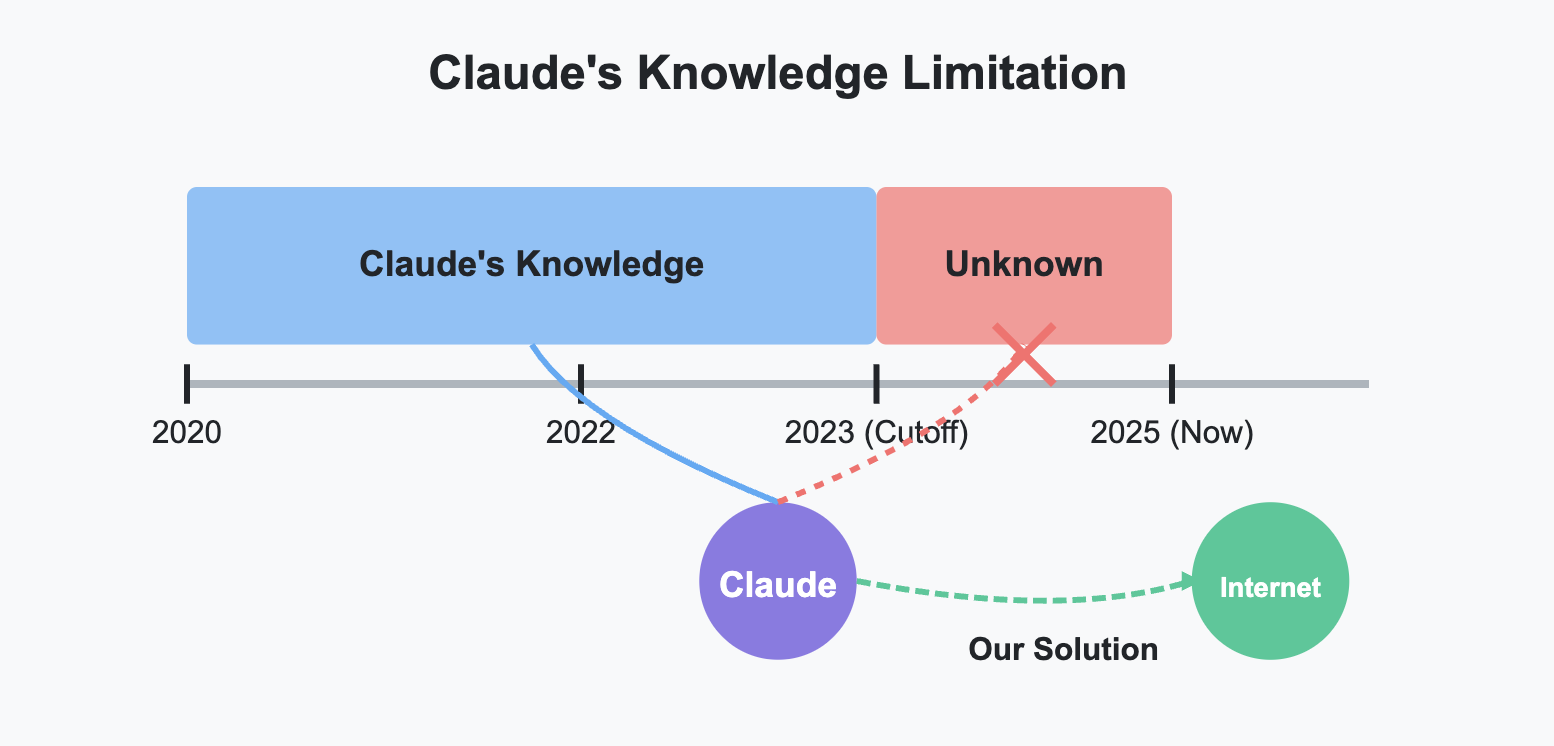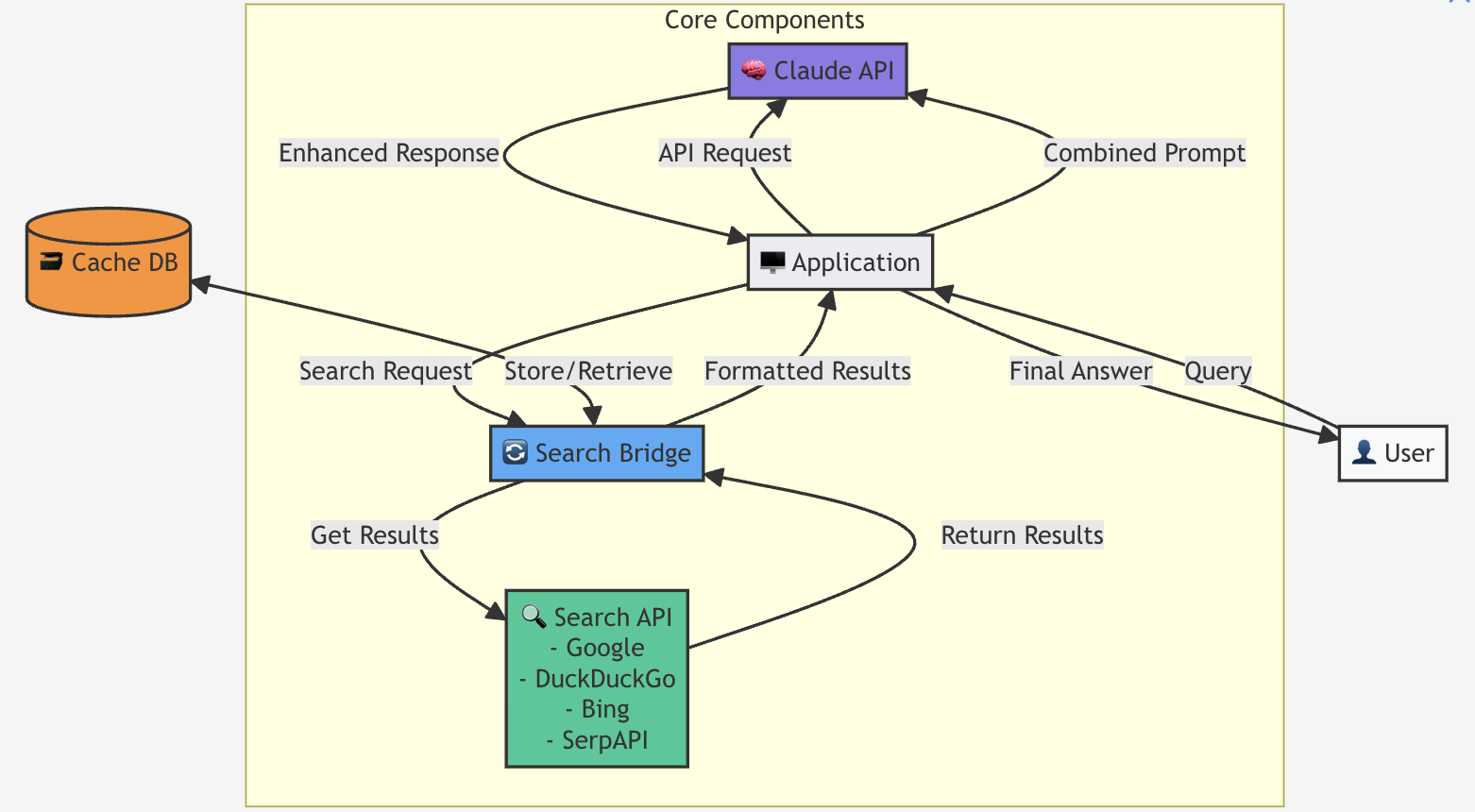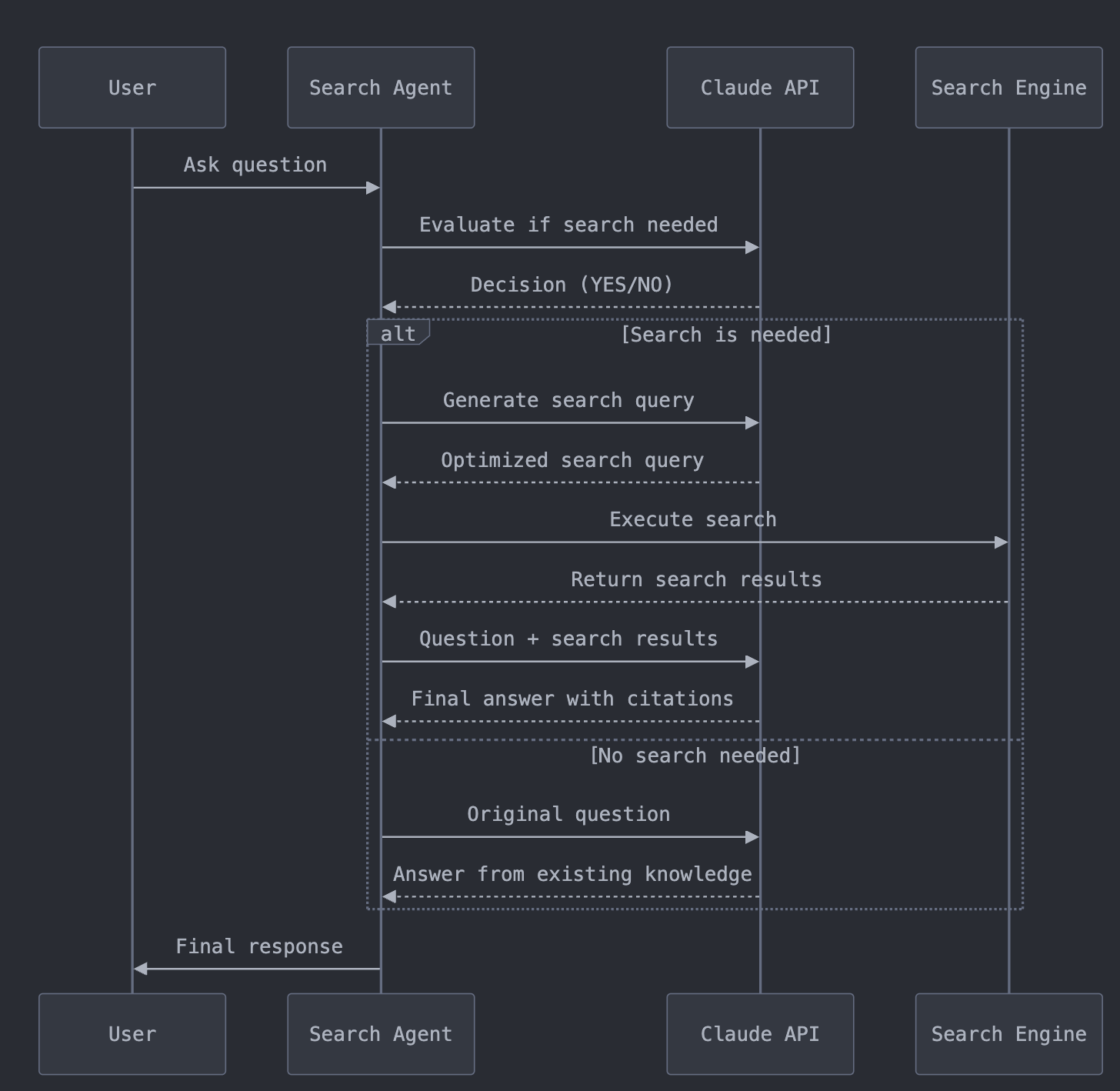Ever asked Claude for the latest tech news only to hit the infamous knowledge cutoff wall? 😫
You're not alone! Claude is mind-blowingly smart, but without internet access, it's like having a genius friend who's been living under a rock since 2023. But what if you could unlock Claude's full potential by giving it real-time access to the entire internet? 🚀 In this tech-packed guide, I'll show you exactly how to supercharge Claude with powerful search capabilities that will transform it from a knowledge-limited AI into your ultimate research assistant. Whether you're a coding wizard or just AI-curious, these solutions will work for you!

Table of Contents
- Understanding Claude's Knowledge Limitations
- Using Claude Sonnet with Built-in Search
- Setting Up a Custom Search Solution
- Creating a WebSocket Bridge for Real-time Search
- Implementing a Search Function with LangChain
- Building a Search Agent with Claude's API
- Troubleshooting and Optimization
1. Understanding Claude's Knowledge Limitations 🧠
Before we hack our way to an internet-connected Claude, let's understand what we're dealing with:
- Claude has a knowledge cutoff date (currently late 2023) after which it's essentially living in the past 🕰️
- It can't browse the web or access real-time data without our help 🌐
- It has no idea what happened in the last GitHub conference, who won the latest tech awards, or what new framework just dropped yesterday 📱
This diagram illustrates Claude's knowledge limitation perfectly:
But don't worry! We're about to fix this limitation with some seriously cool solutions. 💪
2. Using Claude Sonnet with Built-in Search 🔎
The easiest (but not always cheapest) way to give Claude search superpowers is using the official built-in search feature:
Enabling Official Search
Follow these quick steps to enable search in Claude's web interface:
- Sign up for Claude Pro or Team plan (yes, you'll need to shell out some 💰)
- Head over to Claude.ai and log into your account
- Click that little ⚙️ settings icon lurking in the top right corner
- Find "Web Search" under "Experimental Features" and flip that toggle ON
- Start a fresh convo and watch Claude flex its new search muscles! 💪
Pro tip: Claude doesn't always automatically search unless you make it super obvious. Try explicitly saying:
Hey Claude, please search the web for the latest developments in quantum computing for 2025.You'll know it worked when Claude starts dropping fresh URLs and citing sources it just found online. It's like magic, but it's actually just good engineering! ✨
3. Setting Up a Custom Search Solution 🛠️
Not satisfied with the basic solution? Want to get your hands dirty with some real code? Let's build our own search-enabled Claude! This is perfect if you're using the API or need more control over how Claude searches.
Python Search Solution (It's Actually Pretty Simple!)
Check out this Python script that gives Claude search superpowers:
import anthropic
import requests
import os
from dotenv import load_dotenv
# Load your secret keys (never hardcode these!)
load_dotenv()
ANTHROPIC_API_KEY = os.getenv("ANTHROPIC_API_KEY")
SERPER_API_KEY = os.getenv("SERPER_API_KEY") # Serper.dev gives 100 free searches/month!
# Fire up the Claude engine
client = anthropic.Anthropic(api_key=ANTHROPIC_API_KEY)
def search_web(query):
"""Search the web using Serper API - way cheaper than building your own crawler 😉"""
url = "https://google.serper.dev/search"
payload = {"q": query}
headers = {
"X-API-KEY": SERPER_API_KEY,
"Content-Type": "application/json"
}
response = requests.post(url, json=payload, headers=headers)
return response.json()
def search_and_respond(user_query):
# First, let's ask Claude if we even need to search
should_search_message = client.messages.create(
model="claude-3-sonnet-20240229",
max_tokens=1000,
system="You determine if the user's query requires recent information or internet search. Return ONLY 'YES' or 'NO'.",
messages=[
{"role": "user", "content": f"Does this query require internet search? Query: {user_query}"}
]
)
needs_search = "YES" in should_search_message.content
if needs_search:
# Extract the perfect search query (Claude is great at this!)
search_query_message = client.messages.create(
model="claude-3-sonnet-20240229",
max_tokens=1000,
system="Extract a clear, concise search query from the user's question. Return ONLY the search query text.",
messages=[
{"role": "user", "content": user_query}
]
)
search_query = search_query_message.content.strip()
search_results = search_web(search_query)
# Format the search results for Claude to digest
formatted_results = "Search results:\n\n"
for result in search_results.get("organic", [])[:3]: # Top 3 results to avoid info overload
formatted_results += f"Title: {result.get('title')}\n"
formatted_results += f"Link: {result.get('link')}\n"
formatted_results += f"Snippet: {result.get('snippet')}\n\n"
# Now let Claude work its magic with the search results
response = client.messages.create(
model="claude-3-sonnet-20240229",
max_tokens=2000,
system="You have access to recent web search results. Use this information to provide an accurate, up-to-date response. Always cite your sources so the human knows you're not making things up.",
messages=[
{"role": "user", "content": user_query + "\n\n" + formatted_results}
]
)
else:
# Regular Claude response (no search needed)
response = client.messages.create(
model="claude-3-sonnet-20240229",
max_tokens=2000,
messages=[
{"role": "user", "content": user_query}
]
)
return response.content
# Let's make it interactive!
if __name__ == "__main__":
print("🔍 Claude Search Bot Activated! 🚀")
while True:
query = input("You: ")
if query.lower() == 'exit':
print("Search bot shutting down... 👋")
break
response = search_and_respond(query)
print("\nClaude: ", response)
How cool is that? 🤓 This script first checks if your question needs searching, then uses Serper.dev (which has a generous free tier) to grab fresh data from the web. The best part? It doesn't search for questions Claude already knows the answer to, saving you API calls and money! 💰
4. Creating a WebSocket Bridge 🌉
Ready to level up? Let's build a real-time WebSocket bridge that keeps Claude connected to search services constantly:
Here's a diagram of how our architecture will work:

WebSocket Server Implementation
// server.js - The brains of our operation
const WebSocket = require('ws');
const { Anthropic } = require('@anthropic-ai/sdk');
const axios = require('axios');
require('dotenv').config();
// Initialize our Claude connection
const anthropic = new Anthropic({
apiKey: process.env.ANTHROPIC_API_KEY,
});
// Set up WebSocket server - this is where the magic happens ✨
const wss = new WebSocket.Server({ port: 8080 });
async function searchWeb(query) {
try {
const response = await axios.get('https://api.search.provider.com/search', {
params: { q: query },
headers: { 'Authorization': `Bearer ${process.env.SEARCH_API_KEY}` }
});
return response.data;
} catch (error) {
console.error('Search error:', error);
return { error: 'Failed to fetch search results' };
}
}
wss.on('connection', (ws) => {
console.log('🤖 Client connected');
ws.on('message', async (message) => {
const data = JSON.parse(message);
if (data.type === 'query') {
console.log(`📝 Received query: ${data.content}`);
// First, Claude decides if we need to search
const needsSearch = await anthropic.messages.create({
model: "claude-3-sonnet-20240229",
max_tokens: 100,
system: "Determine if this query needs internet search. Reply with ONLY 'YES' or 'NO'.",
messages: [{ role: "user", content: data.content }]
});
if (needsSearch.content.includes('YES')) {
// Search time! First, let's craft the perfect query
const searchQueryMsg = await anthropic.messages.create({
model: "claude-3-sonnet-20240229",
max_tokens: 100,
system: "Extract a clear search query from this. Return ONLY the query text.",
messages: [{ role: "user", content: data.content }]
});
const searchQuery = searchQueryMsg.content.trim();
console.log(`🔍 Searching for: ${searchQuery}`);
const searchResults = await searchWeb(searchQuery);
// Format results for Claude's consumption
let formattedResults = "Search results:\n\n";
if (searchResults.items) {
searchResults.items.slice(0, 3).forEach(item => {
formattedResults += `Title: ${item.title}\n`;
formattedResults += `URL: ${item.link}\n`;
formattedResults += `Description: ${item.snippet}\n\n`;
});
}
// Get Claude's final answer using our fresh data
const response = await anthropic.messages.create({
model: "claude-3-sonnet-20240229",
max_tokens: 1000,
system: "You have access to recent web search results. Use this information to provide an up-to-date response. Always cite your sources.",
messages: [{ role: "user", content: data.content + "\n\n" + formattedResults }]
});
ws.send(JSON.stringify({
type: 'response',
content: response.content,
searchPerformed: true
}));
} else {
// No search needed, just regular Claude smartness
const response = await anthropic.messages.create({
model: "claude-3-sonnet-20240229",
max_tokens: 1000,
messages: [{ role: "user", content: data.content }]
});
ws.send(JSON.stringify({
type: 'response',
content: response.content,
searchPerformed: false
}));
}
}
});
ws.on('close', () => {
console.log('Client disconnected 👋');
});
});
console.log('🚀 WebSocket server running on port 8080');
Client-Side Implementation
// client.js - The user-facing part
const ws = new WebSocket('ws://localhost:8080');
ws.onopen = () => {
console.log('✅ Connected to Claude search server');
document.getElementById('status').textContent = 'Connected';
};
ws.onmessage = (event) => {
const data = JSON.parse(event.data);
if (data.type === 'response') {
const responseElement = document.getElementById('response');
responseElement.innerHTML = data.content;
if (data.searchPerformed) {
document.getElementById('search-indicator').textContent = '🔍 Internet search was performed';
} else {
document.getElementById('search-indicator').textContent = '🧠 Answered from Claude\'s knowledge';
}
document.getElementById('loading').style.display = 'none';
}
};
ws.onclose = () => {
console.log('❌ Disconnected from server');
document.getElementById('status').textContent = 'Disconnected';
};
document.getElementById('query-form').addEventListener('submit', (e) => {
e.preventDefault();
const queryInput = document.getElementById('query');
const query = queryInput.value.trim();
if (query) {
document.getElementById('loading').style.display = 'block';
document.getElementById('response').innerHTML = '';
document.getElementById('search-indicator').textContent = '';
ws.send(JSON.stringify({
type: 'query',
content: query
}));
}
});
This WebSocket implementation is like giving Claude a direct line to the internet that stays open 24/7. It's perfect for building applications where users expect real-time, up-to-date answers without refreshing the page. 🚀
5. Implementing a Search Function with LangChain 🔗
If you're a fan of LangChain (and let's be honest, who isn't?), here's how to add search capabilities to Claude using their awesome framework:
from langchain_anthropic import ChatAnthropic
from langchain_community.tools import DuckDuckGoSearchRun
from langchain.agents import Tool, AgentExecutor, create_react_agent
from langchain.prompts import PromptTemplate
import os
from dotenv import load_dotenv
# Load environment variables
load_dotenv()
ANTHROPIC_API_KEY = os.getenv("ANTHROPIC_API_KEY")
# Set up DuckDuckGo search - completely free and no API key required! 🦆
search_tool = DuckDuckGoSearchRun()
# Define the tools Claude can use
tools = [
Tool(
name="Search",
func=search_tool.run,
description="Useful for when you need to answer questions about current events or information that requires internet search."
)
]
# Initialize Claude
claude = ChatAnthropic(
model_name="claude-3-sonnet-20240229",
anthropic_api_key=ANTHROPIC_API_KEY,
temperature=0.2 # Keep it factual
)
# Create the agent prompt - this is where the magic happens
prompt = PromptTemplate.from_template(
"""You are an intelligent assistant with access to search tools.
When a user asks for information that might require up-to-date data or is beyond your training data,
use the Search tool to find relevant information.
{tools}
Use the following format:
Question: the input question you must answer
Thought: you should always think about what to do
Action: the action to take, should be one of [{tool_names}]
Action Input: the input to the action
Observation: the result of the action
... (this Thought/Action/Action Input/Observation can repeat N times)
Thought: I now know the final answer
Final Answer: the final answer to the original input question
Begin!
Question: {input}
Thought: """
)
# Create the agent
agent = create_react_agent(claude, tools, prompt)
# Create an agent executor
agent_executor = AgentExecutor.from_agent_and_tools(
agent=agent,
tools=tools,
verbose=True # Set to True to see the agent's thought process (super cool to watch!)
)
# Function to handle user queries
def ask_with_search(query):
response = agent_executor.invoke({"input": query})
return response["output"]
# Demo time!
if __name__ == "__main__":
print("🔗 LangChain-powered Claude Search Agent 🧠")
print("Ask me anything - I'll search the web if needed!")
while True:
user_query = input("\n🧑💻 You: ")
if user_query.lower() == 'exit':
print("Goodbye! 👋")
break
response = ask_with_search(user_query)
print("\n🤖 Claude: ", response)
The coolest part about using LangChain? It handles all the agent thinking for you! Watch the verbose output and you'll see Claude literally reasoning through when to search and what to search for. It's like getting a peek inside Claude's digital brain! 🧠
6. Building a Search Agent with Claude's API 🤖
For the ultimate search integration, let's leverage Claude's own tools framework. This is the cleanest and most "official" way to add search capabilities:
Here's how the search agent workflow operates:

import anthropic
import requests
import json
import os
from dotenv import load_dotenv
# Load environment variables
load_dotenv()
ANTHROPIC_API_KEY = os.getenv("ANTHROPIC_API_KEY")
SERPER_API_KEY = os.getenv("SERPER_API_KEY")
# Initialize Claude client
client = anthropic.Anthropic(api_key=ANTHROPIC_API_KEY)
# Define the tools Claude can use - this is the official way! 🛠️
tools = [
{
"name": "search",
"description": "Search for current information on the internet",
"input_schema": {
"type": "object",
"properties": {
"query": {
"type": "string",
"description": "The search query"
}
},
"required": ["query"]
}
}
]
# Function to handle search requests
def search_web(query):
url = "https://google.serper.dev/search"
payload = {"q": query}
headers = {
"X-API-KEY": SERPER_API_KEY,
"Content-Type": "application/json"
}
response = requests.post(url, json=payload, headers=headers)
results = response.json()
# Extract relevant information
top_results = []
if "organic" in results:
for result in results["organic"][:5]: # Top 5 results
top_results.append({
"title": result.get("title", ""),
"link": result.get("link", ""),
"snippet": result.get("snippet", "")
})
return {
"results": top_results
}
# Function to process Claude's tool use requests
def process_tool_calls(tool_calls):
tool_results = []
for tool_call in tool_calls:
if tool_call["name"] == "search":
# Parse the arguments
args = json.loads(tool_call["input"])
query = args["query"]
# Execute the search
search_results = search_web(query)
# Add to results
tool_results.append({
"tool_call_id": tool_call["id"],
"output": json.dumps(search_results)
})
return tool_results
# Function to interact with Claude with search capability
def claude_with_search(user_message):
try:
# Initial message to Claude
message = client.messages.create(
model="claude-3-sonnet-20240229",
max_tokens=2000,
tools=tools, # Here's where we tell Claude about its new search power!
system="You are a helpful assistant with access to internet search. When you need current information or facts outside your knowledge cutoff, use the search tool. Always provide accurate, up-to-date information and cite your sources.",
messages=[
{"role": "user", "content": user_message}
]
)
# Check if Claude wants to use tools
if message.tool_calls:
# Process tool calls
tool_results = process_tool_calls(message.tool_calls)
# Send tool results back to Claude
final_message = client.messages.create(
model="claude-3-sonnet-20240229",
max_tokens=2000,
system="You are a helpful assistant with access to internet search. When you need current information or facts outside your knowledge cutoff, use the search tool. Always provide accurate, up-to-date information and cite your sources.",
messages=[
{"role": "user", "content": user_message},
{
"role": "assistant",
"content": message.content,
"tool_calls": message.tool_calls
},
{
"role": "user",
"tool_results": tool_results
}
]
)
return final_message.content
else:
# Claude didn't need to use tools
return message.content
except Exception as e:
return f"Error: {str(e)}"
# Interactive chat loop
if __name__ == "__main__":
print("🔍 Claude AI with Search Capabilities 🚀")
print("Type 'exit' to quit\n")
while True:
user_input = input("You: ")
if user_input.lower() == "exit":
break
response = claude_with_search(user_input)
print("\nClaude:", response, "\n")
What makes this approach so awesome is that Claude itself decides when to search and what to search for. It's the most natural way to give Claude internet access, and it follows Anthropic's official tools framework. 👌
7. Troubleshooting and Optimization 🔧
Common Issues and Solutions
| Issue | Solution |
|---|---|
| Claude ignores search capability 🙈 | Make your system prompt more explicit, like: "You MUST use the search tool for any questions about events after 2023 or current information." |
| Search results are irrelevant 😕 | Use Claude to generate better search queries: "Extract the most specific search query possible from this question." |
| API rate limiting errors 🛑 | Implement exponential backoff and request throttling. Most search APIs limit requests per second! |
| High latency in responses ⏱️ | Use caching and asynchronous processing. Nobody wants to wait 10+ seconds for an answer! |
Optimizing Search Performance
Want to make your Claude search solution blazing fast? Try these pro tips:
- Implement caching for frequent searches. Don't waste API calls on repeated questions! 💰
- Use parallel processing for search operations when handling multiple requests
- Pre-filter search results before sending them to Claude (remove duplicates and irrelevant results)
- Create a specialized system prompt that teaches Claude exactly how to parse search results
Here's a quick example of a simple but effective cache implementation:
# This simple LRU cache will remember the last 100 search results
# and save you money on redundant API calls 💰
from functools import lru_cache
@lru_cache(maxsize=100)
def cached_search(query):
"""Cache search results to avoid redundant API calls"""
return search_web(query)
# Now you can replace your regular search_web calls with cached_search!
# It's literally a one-line change for potentially big savings
Another big optimization is to pre-process search results before sending them to Claude:
def clean_search_results(results):
"""Clean and deduplicate search results before giving them to Claude"""
seen_urls = set()
clean_results = []
for result in results:
# Skip if we've seen this URL already
if result['link'] in seen_urls:
continue
# Skip if result looks like an ad or spam (customize as needed)
if any(spam_word in result['title'].lower() for spam_word in ['ad', 'sponsored']):
continue
# Add to our clean results
clean_results.append(result)
seen_urls.add(result['link'])
# Stop after 3-5 good results - Claude doesn't need 50 links!
if len(clean_results) >= 5:
break
return clean_results
Conclusion 🚀
Congratulations! You now have FIVE different ways to supercharge Claude with internet search capabilities. From the simple built-in solution to custom API integrations, WebSocket bridges, LangChain agents, and official tools implementation - you're now armed with everything you need to break Claude free from its knowledge cutoff prison.
Which approach should you choose? It really depends on your specific needs:
- 🔵 Just want to try it out? Use Claude's built-in search (option #2)
- 🟢 Building a custom app? The Python search solution (option #3) or tools API approach (option #6) are your best bets
- 🟠 Need real-time updates? Go with the WebSocket bridge (option #4)
- 🟣 Already using LangChain? The LangChain implementation (option #5) will integrate perfectly
The most exciting part? This is just the beginning of what's possible with AI and internet search integration. Imagine combining these techniques with other APIs for weather, stocks, or even IoT devices - you could build an assistant that not only knows the latest news but can also tell you if you need an umbrella today! 🌦️
If you build something cool with these techniques, I'd love to hear about it in the comments! What will you ask your newly internet-enabled Claude first? 🤔
Happy coding! 👨💻
댓글